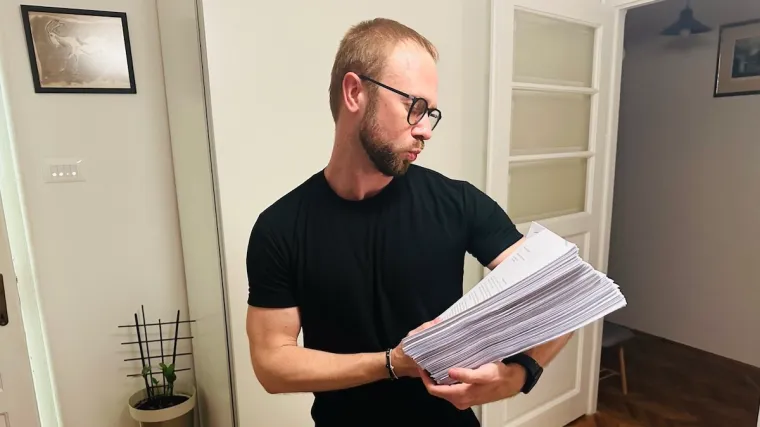Update: A Serbian appeals court announced on September 11 that it has sent the extradition case of Belarusian filmmaker Andrey Gnyot for a third review to the Belgrade Higher Court. Gnyot told CPJ on September 12 that he expects the next hearing “will not happen earlier than a month,” saying that “the most dangerous thing” about the delay is that Belarus’ dictatorship now has a window of opportunity to “make up any number of new fake criminal cases against me,” to try to persuade Serbia to approve the extradition. “I’m not giving up,” he said, “but of course, I’m angry.”
New York, June 18, 2024—A Serbian appeals court must not indulge a request from Belarusian authorities and should overturn a recent decision to extradite journalist Andrey Gnyot to Belarus, the Committee to Protect Journalists said Tuesday.
On May 31, the Higher Court in Belgrade ruled to extradite Gnyot to Belarus for tax evasion, according to media reports and Gnyot, who spoke to CPJ. The decision was made public and communicated to the journalist on June 13.
“They want to extradite me, not right now, but this is a very bad decision,” Gnyot told Belarusian independent news outlet Zerkalo. A tax evasion charge carries up to seven years of imprisonment, according to the Belarusian criminal code.
“The decision to extradite Belarusian journalist Andrey Gnyot to comply with a request from Aleksandr Lukashenko’s repressive regime is not only absurd and unfounded, it also deeply undermines the country’s aspirations to join the European Union,” said Carlos Martínez de la Serna, CPJ’s program director. “The Serbian appeals court should overturn the recent ruling to extradite journalist Andrey Gnyot. Belarusian authorities, on their end, should stop their attempts to instrumentalize Interpol to transnationally repress dissenting voices.”
Gnyot, a filmmaker, collaborated with a range of independent news outlets, including Radio Svaboda, during the 2020 protests demanding President Aleksandr Lukashenko’s resignation after the country’s election. In December 2021, the Belarusian authorities labeled the outlet an “extremist” group.
Serbian authorities arrested Gnyot in Belgrade, the capital, on October 30, 2023, based on an Interpol arrest warrant issued by the Belarusian Interpol bureau. He remained in a Belgrade prison until June 5, when he was transferred to house arrest, according to the Belarusian Association of Journalists (BAJ), an advocacy and trade group operating from exile, and a report by Radio Svaboda, the Belarusian service of U.S. Congress-funded Radio Free Europe/Radio Liberty (RFE/RL).
Gnyot told CPJ that he filed two appeals on June 17, one from himself and one from his lawyers. “I work on my defense every day because a lot of time was lost while I was in prison. So it is not possible for me to relax. Moreover, I even eat and sleep less because I don’t have time. But the end justifies the means — I am fighting to save my life,” he said.
“Everything I provided to the court was ignored,” he added. “We have a saying that ‘hope dies last,’ and of course I expect that the appellate court will correct this mistake, because to do so, you just need to study the evidence provided and not ignore it. It scares me to think that a judge making a decision would so easily send a man to his death.”
Belarusian authorities charged Gnyot with tax evasion for allegedly failing to pay around 300,000 euros (US$323,600) in taxes between 2012 and 2018, according to media reports and a friend of Gnyot, who spoke to CPJ on the condition of anonymity, citing fear of reprisal. Gnyot denies the tax evasion accusations, and his defense considers his persecution as politically motivated.
Gnyot is also one of the founders of SOS BY, an independent association of Belarusian sportspeople that influenced the cancellation of the 2021 Hockey World Cup in Belarus. The Belarusian authorities later designated SOS BY an “extremist” group.
If Gnyot is extradited to Belarus, he could potentially face additional charges for creating or participating in an extremist group, which carries up to 10 years in prison.
Gnyot’s health deteriorated significantly in prison, he said in a May 11 letter reviewed by CPJ. As of June 18, he still had not managed to get medical care while under house arrest, he told CPJ.
“Unfortunately, I have never received any medical help, and I can’t arrange it myself: one hour of freedom to leave my apartment to get to the doctor and get medical help is just physically not enough for me,” he said. “Psychologically I feel good, because I see a huge support and solidarity of people.”
CPJ emailed the Higher Court and the Court of Appeal in Belgrade for comment on Gnyot’s case but did not receive any response.
Separately, on June 8, Serbian border police in Belgrade’s Nikola Tesla Airport banned Russian-Israeli freelance journalist Roman Perl from entering the country, according to media reports.
“They never explained anything to me at the airport but just gave me a paper stating that my entry into Serbia would pose a security risk,” Perl, who works with Current Time TV, a project affiliated with RFE/RL and U.S. Congress-funded broadcaster Voice of America, told Serbian broadcaster N1TV.
The journalist believes the ban to be connected to his 2023 brief detention in Serbia, after a man he was interviewing for a documentary about Serbia and Russia’s war in Ukraine unfurled a Ukrainian flag near the Russian Embassy. Russian authorities labeled Perl a “foreign agent” in October 2021.
Belarus was the world’s third-worst jailer of journalists, with at least 28 journalists behind bars on December 1, 2023, when CPJ conducted its most recent prison census. Serbia had no journalists behind bars at the time, except for Gnyot, who was not included in the census due to a lack of information about his journalism.
